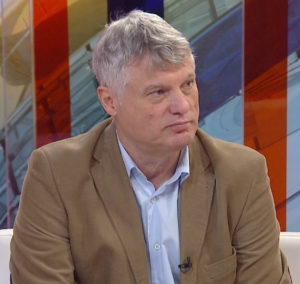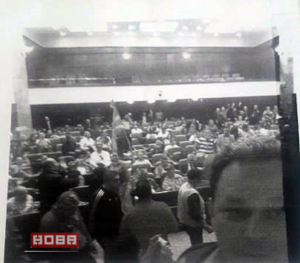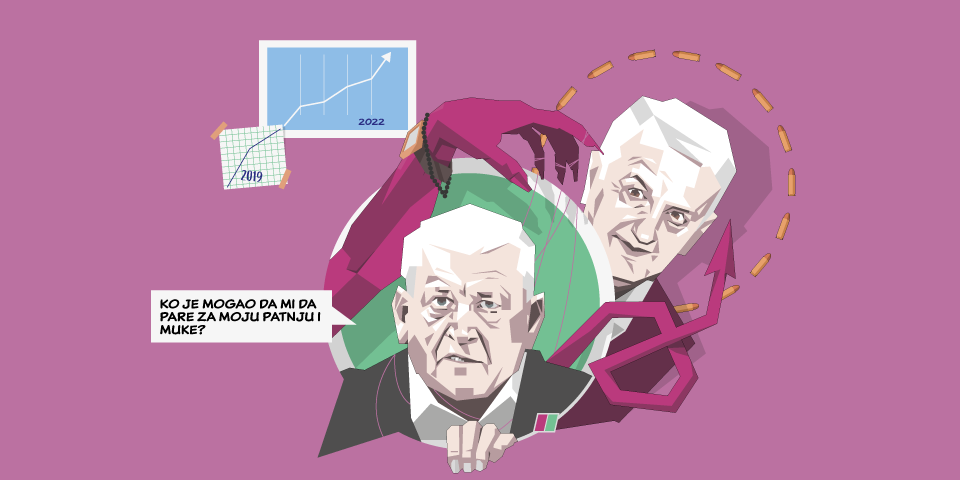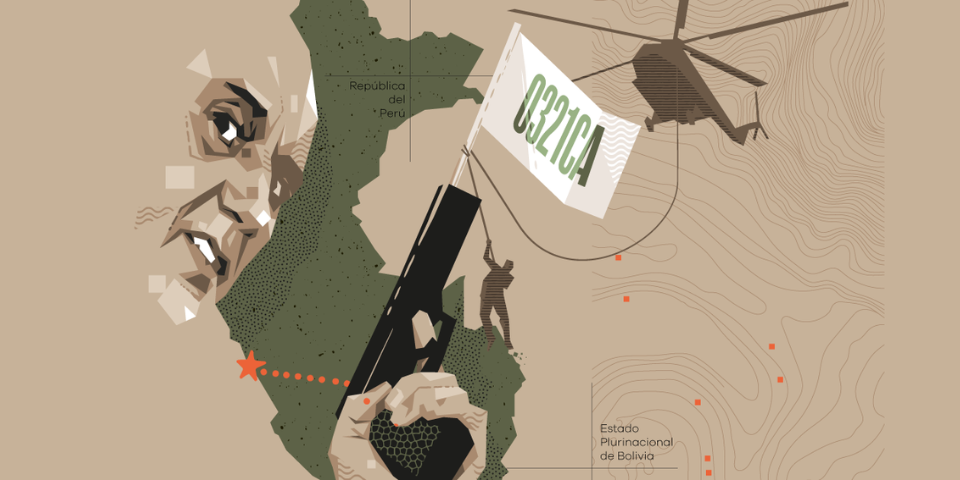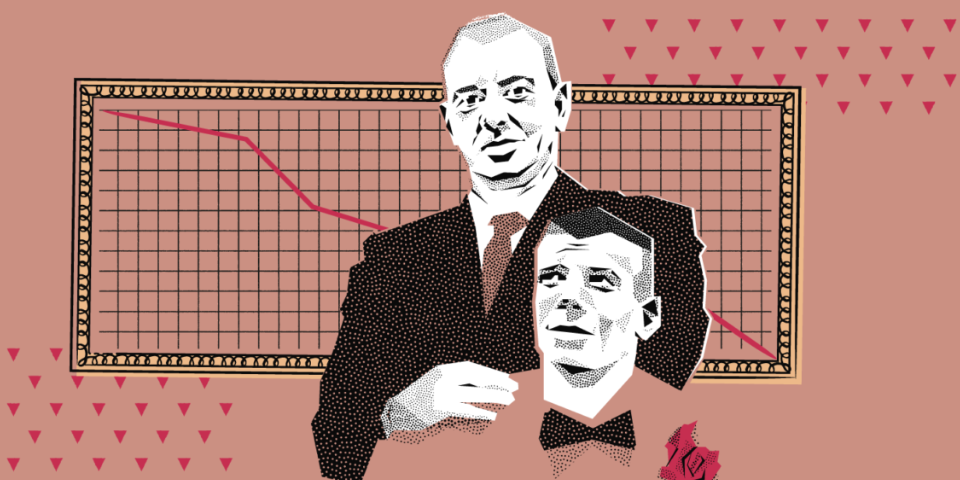Serbia’s Involvement in the Macedonian Crisis
Serbia’s Involvement in the Macedonian Crisis

Serbian journalist and MP Miroslav Lazanski was involved in a coordinated propaganda campaign along with members of Serbia’s intelligence service, the BIA, aimed at mobilizing public support for Macedonia’s ex-Prime Minister Nikola Gruevski and Russia in Macedonia, intercepted conversations and other leaked intel from Macedonian intelligence show. Lazanski describes these claims as false, and says that he was only doing his job as a journalist.
By: Stevan Dojčinović, Saška Cvetkovska, Biljana Sekulovska, Bojana Jovanović, Bojana Pavlović and Aubrey Belford
Translation from Serbian: Sergej Dojčinović from Balkanist
On March 3rd, Goran Živaljević, a member of Serbia’s intelligence agency, BIA, made a call to Ivan Stoilković, a Macedonian MP and the president of Macedonia’s Serbian Democratic Party. Živaljević told him that he was hosting a journalist named Miroslav Lazanski in Skopje who could do them a favor.
“Hey, I’m hosting [Lazanski], and briefed him on the column he is supposed to write today in [Serbia’s] Politika daily newspaper. We are going to see the protests, and then when we go sit somewhere tonight, I will give you a call,” Stoilković told Živaljević, according to a transcript obtained by KRIK, Nova TV and Organized Crime and Corruption Reporting Project (OCCRP).
The conversation continued the following day and featured the mysterious journalist. Stoilković stated that he was to bring Lazanski to a meeting with the leader of Macedonia’s ruling party VMRO-DPMNE, former Prime Minister Nikola Gruevski.
“At 20:45 I’ll pick up Lazanski from the hotel, and then I’ll take him to Gruevski, so wait for us at the hotel until we return,” Stoilković said.
The day after this meeting, Lazanski, a journalist and MP in the Serbian parliament, published a column in Politika titled “We are not giving Macedonia away”. In it, the author writes about his support for Gruevski, who at the time was trying to prevent Macedonia’s main opposition party SDSM — which had formed a coalition that had enabled it to form a parliamentary majority — from entering power.
“New elections are the solution,” Lazanski wrote in his article for Politika, an opinion in line with Gruevski’s own official stance at the time. Lazanski also compared Zaev to Hitler. “Hitler also won power through informal elections,” he wrote.
Everyone involved in the operation was satisfied with the job Lazanski had done. The same day the column was published, Živaljević and Stoilković spoke on the phone again.
“Lazanski just called. He says that his article is breaking records in Serbia,” Stoilković said.
“Great, great,” Živaljević replies, who was the main orchestrator of the operation, per the content of the conversations.
“He is very happy and gloating and says ‘F… Ivan, all the readership records have been broken in Serbia’. He is happy and satisfied”.
“OK”.
“Tonight I am going to RTS (Ratio Television of Serbia), for the statement we recorded today, it will be on the news,” Stoilković ends the conversation.
Propaganda actions
These transcripts were a part of the material Macedonian intelligence collected by following and wiretapping Živaljević and Stoilković. KRIK, Nova TV, and OCCRP journalists gained access to intelligence reports, transcripts, audio, and photo material. The documents claim that the Macedonian courts allowed them to conduct the monitoring.
The evidence collected, the intelligence agency claims, demonstrates that “through information gathered from Živaljević and Stoilković from March 2017, journalist, military analyst and a member of the ruling Serbian party SNS (Serbian progressive party) was brought to Macedonia to collude on propaganda”.
The goal, as described, was to promote Russia and Gruevski’s influence, and also to strengthen Macedonia’s opposition to NATO membership.
After 10 years in power, Gruevski proved himself an autocrat with little regard for democratic processes or media freedom. During the decade of his rule, secret services wiretapped more than 30,000 people, and leading newspapers were prohibited from criticizing his government. The opposition, led by Zaev, published recordings or “bombs” of Gruevski’s conversations with his subordinates which revealed his government was involved in corruption and election fraud. Gruevski and his allies were put under an investigation for money laundering, election fraud, illegal wiretapping and theft of government funds. More recently, Gruevski has found support from Russia.
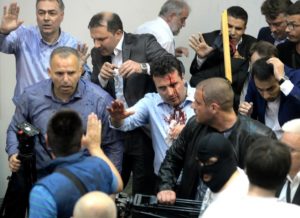
Zoran Zaev, then opposition leader, bloodied during violence in Macedonia’s parliament on April 27. Credit: Photo: Nake Batev / NOVA TV
Aleksandar Vučić and the authorities in Belgrade never lent direct support to Gruevski, but Serbian pro-government media ran campaigns against Zaev, the leader of the Macedonian opposition who won the mandate to form the new government.
The documents show that BIA agent Živaljević gave instructions to Stoilković, who then briefed Lazanski on who to meet and the kinds of topics he should address in the media. Stoilković was present at some of the meetings, including the time Lazanski met Gruevski.
There is also a list in the documents that shows which of Lazanski’s articles were marked as propaganda, most of which were published in Serbia’s pro-government tabloid Informer. Some of them were written by Lazanski, and in them he outlined Russian military power and argued for increased cooperation with Russia rather than NATO. Lazanski also wrote that the demonstrations in Macedonia were directly organized by the West, claiming that they were provoked by the US to prevent the building of the Russo-Turkish gas pipeline.
Enthralled by Putin
Lazanski is famous in Serbia for his pro-Russian positions. Throughout the years he has meticulously constructed a macho, military-political analyst image for himself, who besides writing for newspapers, also votes at beauty pageants and poses for pictures wearing military equipment. In 2014, he interviewed Vladimir Putin, an experience which left him “stunned”.
He became an MP in 2016, and was listed 8th on the SNS’s list as an independent. He stated that Aleksandar Vučić had a vision and that he was the best option for Serbia’s future.
“Vučić called me personally and asked me if I would be willing to help as an independent member. I couldn’t reject his call,” he said.
In a conversation with KRIK, Lazanski claims that he was only doing his job as a journalist in Macedonia.
“I am neither a member of the state intelligence, nor its spokesperson,” he said. “I wasn’t there as an MP; I was there as a journalist from Politika and also as someone covering the situation for a television station from Republika Srpska,” he claimed.
“Throughout my career as a journalist I’ve had contacts from all the major intelligence services such as the KGB, CIA, French and German services. Usually, when I arrive in a foreign country, I make sure the Serbian embassy knows. Mr Živaljević is a legitimate and accredited member of BIA in Skopje.”
He confirmed that he’d met Gruevski, but described the meeting as a “failed attempt to get an interview.”
“I talked to Gruevski as a journalist, the same way I talked to Živaljević and the leader of Serbian Democratic Party in Macedonia. It was supposed to be an interview, but Gruevski postponed it, and later, as time passed, it became uninteresting to me.”
Selfie
Goran Živaljević is a long-time member of the intelligence services, and from January 2003 to March 2004 he was BIA’s deputy director. Since 2005 he has been a part of the diplomatic service, working as an adviser to the Serbian embassy in Macedonia.
The documents claim that as the political situation in Macedonia worsened, his diplomatic duties turned into intelligence duties.
Once the Macedonian services started observing his movements, they found out that Živaljević met many politicians and businessmen in Macedonia.
It was also revealed that the agent was present in the Macedonian parliament at the time when masked men entered and physically attacked members of then-opposition parties. Several members of parliament, along with Zaev, ended up receiving severe injuries. Footage from security cameras showed that the men were let into the parliament by members of Gruevski’s party. Not long after the incident, the international community pushed the president to allow Zaev to form a new government.
Živaljević marked his presence in the parliament with a selfie as masked men beat members of the opposition, which journalists from KRIK, Nova TV and OCCRP found in the documents. It is unknown whether Živaljević published the selfie somewhere or the intelligence services found it while searching through his documents.
Serbian PM Aleksandar Vučić and FM Ivica Dačić claimed that Živaljević was doing his job in the parliament at the time of the incident.
“His job is to inform us about what is happening in Macedonia. Živaljević is the official representative of the BIA in Macedonia; he isn’t there illegally,” Dačić said.
Information from Macedonian intelligence services tells a different story.
“From our investigation, it can be concluded that Goran Živaljević, a member of the BIA in Macedonia, was using methods outside of his boundaries that diplomatic status gave him… which then questions the legitimacy and legality of his actions.”
Goran Živaljević declined a request for an interview, saying he did not want to comment.
Russian influence
Stoilković became a member of Macedonia’s parliament in 2002 as a member of the Serbian Democratic Party in Macedonia (DPSM).
Macedonian intelligence describes him as a nationalist who conducts actions in accordance with President Tomislav Nicolić’s cabinet, other Serbian officials, and members of the BIA.
His meetings with Živaljević were frequent whenever “there was an important vote in the parliament or a government meeting”.
The Macedonian intelligence documents stated that, “Findings from his [Stoilković’s] contacts with Russian diplomats and other activities confirm that his political orientation was in fact based on Russian influence in the Balkans, with the goal of shutting down Euro-Atlantic integration and Western influence.”
As the president of the Serbian Democratic Party, Stoilković signed a document in 2016 called “The declaration of the formation of the neutral military zone in the Balkans” alongside Vladimir Putin’s party, United Russia.
Documents show that Stoilković had been under surveillance since 2013. Despite that fact, Gruevski accepted him as a coalition partner.
He did not want to talk to our journalists, and was irritated when asked about his connections to Živaljević.
“Did I ask you who you communicate with? How are you not ashamed? Ask me a normal question,” he said.
He hung up before we could.

